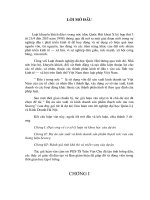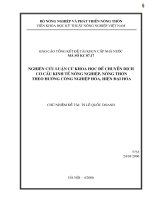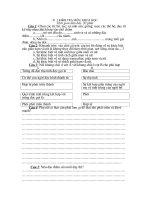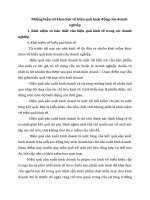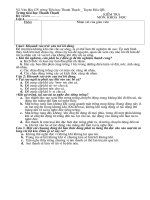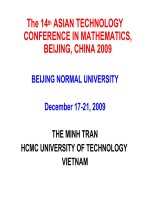Bài luận ppl khoa học research methodology
Bạn đang xem bản rút gọn của tài liệu. Xem và tải ngay bản đầy đủ của tài liệu tại đây (71.32 KB, 7 trang )
Name:
Class:
Subject: Research Methodology
Topic: The effects of group work activities on motivating the first- year students
in speaking lessons.
CONTENT
I.
Rationale
In the global world, English has rapidly become an international language. To
meet this requirement, English has been taught almost every where in Vietnam.
Especially in schools, colleges, universities, English is a compulsory subject.
However, how to speak English well still remains a question for many learners of this
language, especially for the first - year students of universities to answer.
The use of group work in classroom activities is a method used for motivating
learning and increasing the idea of pleasure through learning. Speaking is an
important skill and producing out loud language can be intimidating for nonnative
speakers at any point in their journey. When group work happens, whether it is in the
work place or the classroom, collaboration is part of the process, It does not just get
the students to speak but also get them to be more involved in other activities. Groupwork can help shy students, who never say anything in a whole class activity.
The concept of group work is used by many teachers and college professors all
over the world. The reason why teachers and college professors use group work is
because it is an effective method that improves the student's ability to use critical
thinking and be able to out judge and out reason why he chose that answer. The other
reason is because it involves collaborative teamwork which involves the student to
work amongst a group and being able to exchange ideas, so that the task is finished
within a certain deadline. They help the students to carry any barriers or shyness that
he or she may have which is preventing him from speaking and it allows him to speak
freely.
An extremely challenging question still remains: “How to motivate students to
speak without hesitation?”. Being a teacher for more than 3 years has helped the
researcher realize that students always struggle when they are asked to do speaking
tasks. They find it difficult to express their ideas in English. In addition, their
participation in speaking classes is always unequal. To tackle these problems, groupwork activities are taken into a careful consideration in order to enhance students’
speaking skills.
II. Aims of the Study.
The aim of this study is to inquire how group-work makes a contribution towards
improving speaking skills of the first-year students.
III. Research question.
How is group-work used to improve speaking skills of the first-year students?
What is the effectiveness of group-work approach for improving students’
speaking skills after It is applied?
IV. Scope of study
- Due to the small scale of the study and the limitation of time, this study only
focuses on examining how group-work techniques are used to improve the speaking
skills of a group of first-year students of Ha Long University.
V. Methods of Study
Survey
Analysis
Conclusion
To achieve the objectives Mated, both qualitative and quantitative methods were
used. The qualitative data collected for the study come from semi-interviews before
and after intervention. The quantitative data were the students' score of speaking based
on average score of each aspect of speaking competence and the calculation of
average score of students’ speaking for the whole performance.
VI. Tentative Design of the Study.
Part A: Introduction includes the rationale, aims, scope, significance and
methodology of the study.
Part B: Development
Chapter 1 : Literature review presents literature related to the study including the
theoretical background of speaking such as nature of speaking skill, teaching speaking
in a classroom and testing speaking and review of existing related works. Theoretical
background of group-work elaborates the definition of group-work, the advantages
and disadvantages of group-work, and the principles in organizing group-work in
speaking class.
Chapter 2: Methodology shows the procedure for carrying on the research such
as survey, records, observation, and methods of data analysis.
Chapter 3: The results of the study report the main findings obtained from the
data collection and discuss the prominent aspects.
Part C: Conclusion is the summary of the whole study. The limitations of the
study and suggestions for further study are also recommended in this part.
VII. Literature Review
1. Theoretical background
1.1. Theoretical background of speaking
1.1.1. Nature of speaking skill
It can be concluded that speaking is ability to express something which
involved the ability in utilizing the words in the correct order, correct pronunciation,
right grammatical form, and meaningful context (fluency) and making a good choice
of words (vocabulary) in the process of interpreting and negotiating meaning in
conveying messages to establish and maintain social relationship.
1.1.2 Teaching speaking in a classroom
In this study, the researcher utilized group-work activities in the hope of
increasing interaction among learners; accordingly, they can build confidence in
speaking and improve their speaking skill. Topics were chosen carefully for the
purpose of stimulating learners' interest and motivating a great deal of discussion
among group members. To accomplish these goals, chosen topics should be suitable
for them because awkward ones might discourage them from engaging in discussion
session
1.1.3 Testing Speaking
Learning groups can be initiated by asking students to turn to their partners and
spending two minutes discussing the question that the teacher has asked. The teacher
can also form a group of three - five to solve the problem. Groups can be formed at
any time in a class of any size to check on students' understanding of the materials,
to give students an opportunity to apply what they are learning, or to provide a
change of pace.
1.2 Theoretical background of group-work
1.2.1 Definition of group-work
Cohen (1994:1) states that group work refers to "students working together in a
group small enough so that everyone can participate on a task that has been clearly
assigned". In addition, Stenaasen and Sletta (2000:25-26) define group work as "A
group consists of two or more people who have a mutual influence on each other and
are mutually depend on another in the sense that they have to trust each other to get
their needs satisfied and achieve their goals..
1.2.2 The advantages of group-work
Working in groups allows learners to achieve higher order thinking skills and
retain knowledge longer than working individually. In groups students discuss,
argue, explain and negotiate meaning, they become more responsible for their
learning and develop critical thinking skills
1.2.3 Disadvantages of group-work
There is a fair amount of literature on problems of group-work. Within the
scope of this research, the most common problems in class, namely intolerable
noises. Overuse of mother tongue, and unbalanced participation among group
members
1.2.4 The principles in organizing group-work in speaking class
- The preparation steps
- Designing group-work activities
- Group forrmation
- Group size
- Group discussion
2. Review of existing related works
VIII. Methodology
2.1 Research design
As Nunan and Bailey (2009) explain, there are different possible definitions for
“classroom research.” Fundamentally, classroom research involves doing research in
school settings about teaching and learning. In this study, group-work technique
namely discussion was employed to improve students' speaking skill. This research
was done in four steps: planning, acting, observing, and reflecting.
2.2 The context of the study
2.2.1. The location and time of research
The research was conducted at Ha Long University for 3 weeks
2.2.2
The students
The subject of the research is first-year students who were in the second
semester. They studied English for the first-half of the semester and passed the final
exam with different scores of speaking.
2.2.3
The textbook
The textbook for the students is “Face2Face Elementary Second Edition”. It
includes 12 units. For the limited time, only the last 4 units with 12 periods of
speaking were employed for the study.
2.3 Procedure of the research
This research was held using the procedures in order to get the data objectively.
- Planning
- acting
- Observing
- Reflecting
2.4. Data collection instruments
- Semi- structured interviews
- Observation and field notes
- Records
2.5 Methods of data analysis
Quantitative data, in this research, were students' score of speaking analyzed by
searching for its average score of each aspects of speaking competence. Then, the
researcher calculated the average score of students’ speaking for the whole
performance. Finally, the researcher compared the result of students' pre-test score
and post-test score. Therefore, chances in students’ quantitative achievement could
be monitored.
VIII. Results of the study
Number of
students
Percentage
Level
Speaking features
60%
- The speech was quite fluent and occasionally
hesitant
- Task fulfillment in a full sentence with ease mood
- correct pronunciation
B (7.0-8.4)
- Using proper vocabulary
- Showing exact use of structures and grammar
- Showing imperfect control of some pattern but no
weakness that causes misunderstanding
20%
- The speech was a bit fluent
- Having several vocabulary needed
C (5.5-6.9)
- Making a few mistakes in pronunciation
- Making a few mistakes in grammar
3
15%
- Task fulfillment occassionally
- Making a fair number of pronunciation mistakes
- Being able to use
D (4.0-5.4)
- The speech was not fluent
- Having limited vocabulary
- Making some mistakes in grammar
1
5%
12
4
F (4.0)
- Poor responding and effort to questions
IX. CONCLUSION.
The findings of this study reveal positive outcomes both in terms of Ha Long
University students’ oral performance and motivation towards the use of group-work
as an effective instructional method in English speaking classrooms in Ha Long
University. In other words, in a comfortable context such as group-work learning, the
students in the experimental group were able to demonstrate higher oral classroom
participation, which is related to their statistically significant gain in language
proficiency. Based on the results, group-work learning had a positive effect on the
student’s speaking skills. During the experiment, the group-work method was used for
the experimental group provided the students with opportunities to speak for most of
the English periods, all of the students were encouraged to speak and tried to be active
so they became more confident and more willing to speak. Group work could also
helped improve the student’s’ oral communicative competence of the target language
because it created a friendlier and more supportive learning environment within which
students had more opportunities and enjoyed the freedom to practice the target
language.
REFERENCES
1. Badache, L. (2011). The Benefits of Group Work. The Social Science and
Human Journal. Retrieved from
2. http:/repository.yu.edu.jo/handle/123456789/449014
3. Brown, H.D. (1994b). Teaching by Principles - An Interactive Approach to
Language Pedagogy. USA: Prentice Hall Regents.
4. Hassanien, A. (2007). A qualitative student evaluation of group learning in
higher education. Higher Education
5. Hendry, G. D., & Davy, H. P. (2005). Independent student study groups.
Blackwell Publishing Ltd. Medical
6. Education, 39, 672-679. />7. Johnson, D. W., & Johnson, R. (2000). Joining together: Group theory and
group skills (7th ed.). Needham
8. Heights: Pearson Education.
9. Burke, A. (2011). Group-work: How to use groups effectively. The Journal of
of Effective Teaching, 11(2), 87 95.
10.Clark, H. & Clark, V. E. (1997). Psychology and Language. Hartcourt:
Hartcourt BracecnJovanich. Inc.
11. Triandis, H. C. (1995). Individualism and collectvism. Boulder, CO: Westview.
12. Trinh, Q. L. (2005). Stimulating learner autonomy in English language
education: A
13. cirriculum innovation study in a Vietnamese context. PhD, University of
Amsterdam, Netherlands.
14. Tuong, N. H. (2002). Vietnam: Cultural background for ESL/EFL teachers.
The Review of Vietnamese Studies 2(1), 11-17
15.Review of Vietnamese Studies, 2(1), 11-17. 13.
16. Doff. A. (1998). Teaching English: A training course for teachers. Cambridge:
Cambridge University Press.
17. Amanda, K. J. (2011). For what purpose do language teachers use group work
in their lessons.
